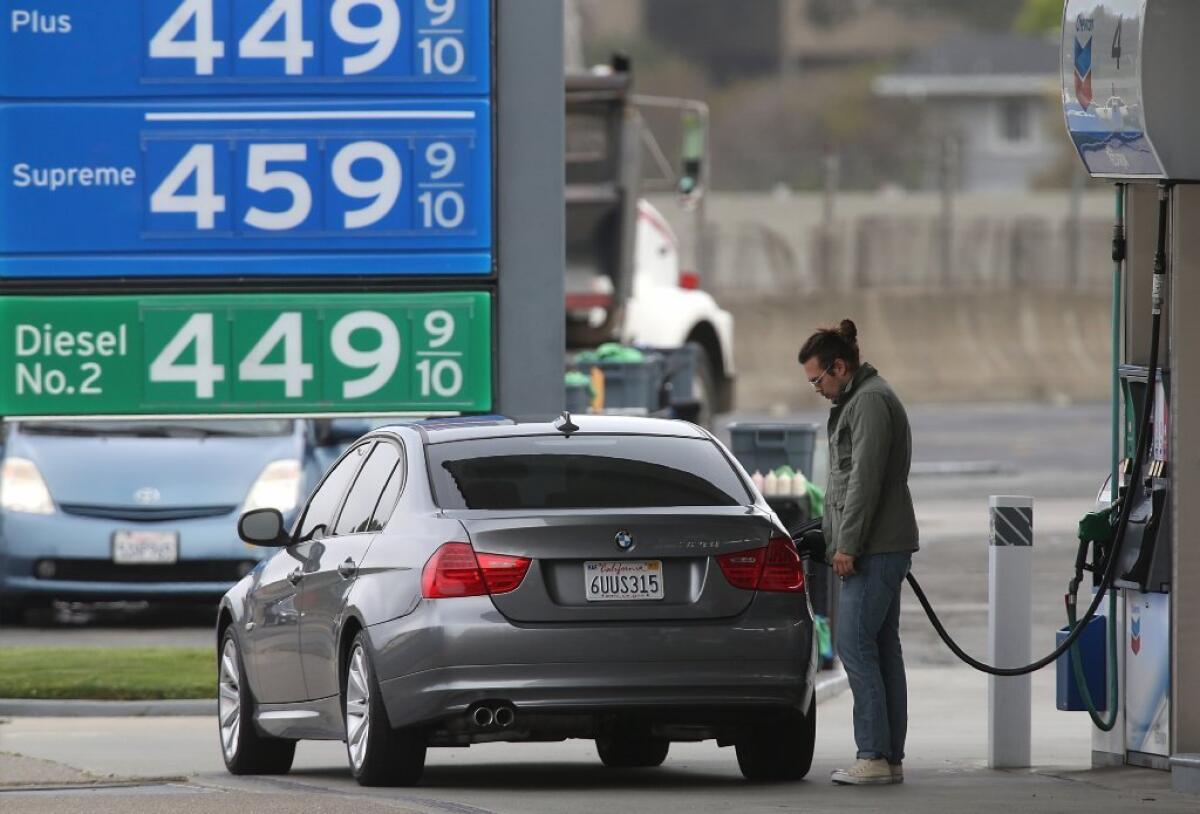Criticism hounds Gov. Gavin Newsom over his plans for California gas tax dollars

- Share via
SACRAMENTO — As Gov. Gavin Newsom ratchets up California’s response to climate change, Republicans and even some in his own party are lashing out at his plans to tap into billions of dollars in gas taxes and vehicle fees earmarked for transportation projects.
The debate centers on the use of up to $5 billion generated annually by SB 1, a 2017 law that increased the gas tax and vehicle fees to address a backlog of road repairs and improve mass transit. Some 20% was dedicated for rail and mass transit, and the law specifies that $100 million annually will be used to build more bike paths, crosswalks and sidewalks.
Newsom upset some fellow Democrats when he vetoed a bill Saturday that his administration said would have expanded the existing law’s $100 million in subsidies for bicyclist and pedestrian improvements to a yearly total of $1 billion.
“This veto is extremely disappointing,” said state Sen. Scott Wiener (D-San Francisco), author of the bill, which he said would fight climate change by making it safer for people to leave their cars behind. “Far too many of our state highways that run through local communities are dangerous for people who aren’t driving cars.”
Other supporters of the bill offered even sharper criticism.
“We are appalled by Governor Newsom’s decision to derail SB 127 despite overwhelming support by the public and the Legislature,” said Tony Dang, executive director of California Walks.
But Newsom’s Department of Finance warned that the legislation’s price tag would have delayed road repair projects promised to voters in 2018 as part of a political campaign that successfully blocked a repeal of the SB 1 fuel taxes.
“I fully support improving facilities to increase walking, biking and accessing public transit,” Newsom wrote in his veto message on Saturday. “However, this bill creates a prescriptive and costly approach to achieve these objectives.”
Newsom assured bicycling and pedestrian activists that help is on the way through an executive order that he issued Sept. 20 — a directive to make more transportation money available for projects that reduce the use of automobiles.
“By implementing my executive order… Caltrans is increasing and accelerating its investments in active transportation where appropriate and feasible,” Newsom said. “I am committed to holding the department accountable to deliver more alternatives to driving while continuing to maintain our state’s highways and bridges.”
The executive order, though, has sparked outrage among Republican lawmakers who have accused the governor of “bait and switch” tactics to shift money from road projects to rail. The debate comes at a time when the new gas taxes have helped boost the average price of a gallon of California gasoline to $4.17 as of Monday, much higher than the national average of $2.63.
Newsom’s order directed the state to spend money on projects “to help reverse the trend of increased fuel consumption and reduce greenhouse gas emissions associated with the transportation sector.”
In response, the California Department of Transportation proposed delaying funding for three highway widening projects in San Luis Obispo County and the Central Valley, instead setting aside $61 million in SB 1 funds “for priority rail projects and other priorities aligned with [the] Executive Order.”
The state Transportation Commission will hold a public hearing on the plan on Oct. 15 in Irvine and could reject the Caltrans decision later this year.
“This is theft of our gas taxes by executive order,” said Assemblyman Jim Patterson (R-Fresno) after the state proposed a funding delay for two projects that would have increased stretches of Highway 99 from four to six lanes in the Central Valley. “Voters approved SB 1 with the promise that our crumbling highways would get the attention they deserve,” Patterson added. “Instead of building capacity, our gas tax funds are being siphoned off to fund Newsom’s favored pet-projects.”
The complaints have touched a nerve with some Democrats, who noted they campaigned against the SB 1 repeal initiative with promises that the money would be used almost exclusively for road repairs and would benefit every part of the state.
“The voters of California recognized those promises and resoundingly defeated a proposal that would have been a roadblock on the way to fixing roads used by residents, businesses and visitors,” said Assembly Speaker Anthony Rendon (D-Lakewood). “Now is not the time to go back on those promises, and the Legislature will stand by those safeguards.”
The Republican charge that Newsom is misdirecting gas tax funds was disputed by David S. Kim, secretary of the California State Transportation Agency.
Kim said the executive order does not supersede a constitutional requirement that SB 1 money be spent on transportation projects and his agency’s priority is to maintain the condition of the state’s roads and bridges.
“Having said that, we are legally required to meet climate goals” set by other state laws, he said. “The transportation sector contributes more than 40 percent of greenhouse gas emissions in the state. Therefore, we must take the necessary steps to reduce the share of greenhouse gas emissions that come from the transportation sector.”
Kim said the executive order is the beginning of discussions on developing a plan to meet climate change goals. But those assurances have not satisfied critics, including Assembly Republican Leader Marie Waldron of Escondido.
“Secretary Kim is deceiving the people of California,” Waldron said. “How can he say he’s not raiding our road money in one sentence, then turn right around and say we need to cut road projects and ‘direct available resources’ elsewhere?”
More to Read
Sign up for Essential California
The most important California stories and recommendations in your inbox every morning.
You may occasionally receive promotional content from the Los Angeles Times.










